The Southern Song Dynasty (南宋, Nán Sòng, 1127-1279 CE) was a remarkable era in Chinese history, characterized by its flourishing culture, economic prosperity, as well as military struggles. It emerged in the aftermath of the fall of the Northern Song Dynasty (北宋) to the Jurchen Jin Dynasty (金朝, Jīn), leading to the establishment of two distinct Chinese states in the north and south.
The Southern Song, centered in Lin'an (临安, modern-day Hangzhou, 杭州), demonstrated remarkable resilience in the face of territorial limitations.
Establishment
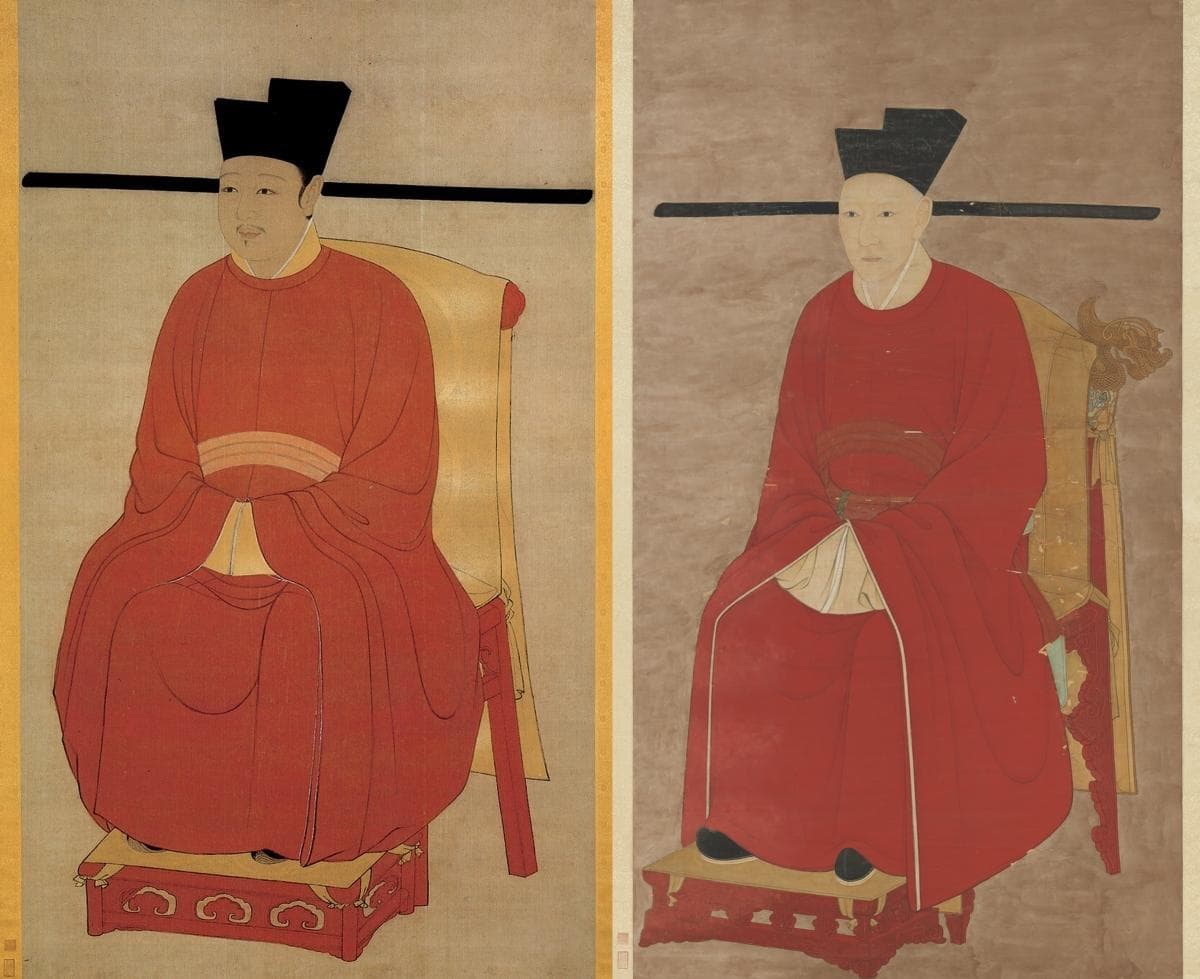
Portraits of Emperor Huizong of Song (left) and Emperor Gaozong of Song (right)
In 1127, during the Jingkang Incident (靖康之难), the Northern Song Dynasty fell as Jurchen Jin (金) forces captured the capital city of Kaifeng (开封), taking Emperor Huizong (宋徽宗), Emperor Qinzong (宋钦宗), royal family members, and court officials totaling over three thousand people northward. Shortly after, the Jin forces withdrew from Kaifeng, and Zhang Bangchang (张邦昌) was installed as a puppet ruler of Da Chu (大楚 or 伪楚). However, he was only on the throne for 33 days.
On June 12, 1127, Zhao Gou (赵构), the only son of Emperor Huizong who had avoided capture, officially ascended to the throne as Emperor Gaozong (宋高宗) in Nanjing (南京), reestablishing Song Dynasty, that is, the Southern Song Dynasty.
At that time, the Southern Song Dynasty still controlled Henan (河南) and Guanzhong (关中).
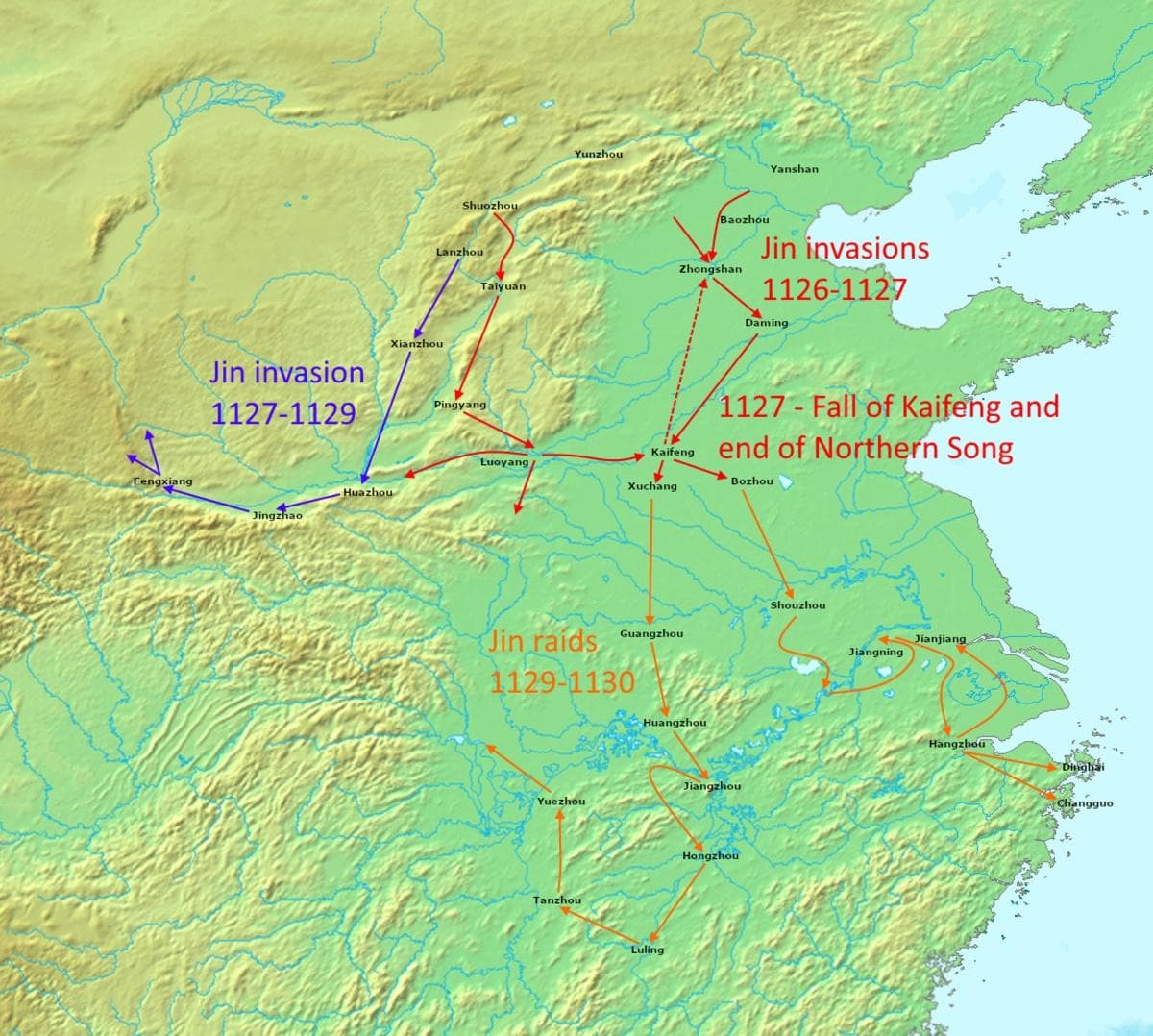
Jin invasions of Song, 1126-1130
Initially, Emperor Gaozong heavily relied on the hawkish faction, appointing Li Gang (李纲) as Grand Chancellor and Zong Ze (宗泽) to defend Kaifeng. They achieved several significant victories against the Jurchen Jin forces, stabilizing the situation. However, Emperor Gaozong lacked the resolve to confront Jin. He soon dismissed Li Gang and others, and repeatedly rejected Zong Ze's pleas to return to Kaifeng to take charge. Before long, Emperor Gaozong fled to Yangzhou (扬州).
In 1128, the Jin forces, led by Wanyan Zongbi (完颜宗弼), launched another massive invasion southward. Emperor Gaozong fled to Hangzhou (杭州) and established it as Lin'an Prefecture (临安府), which was made capital in 1138.
In 1129, a rebellion aimed to depose Emperor Gaozong was swiftly suppressed. Another Jin offensive led by Wanyan Zongbi in the same year forced Gaozong to take refuge at sea. The following spring, Jin forces returned, and General Han Shizhong (韩世忠) led eight thousand elite soldiers, trapping the fifty thousand Jin forces for 48 days, known as the Battle of Huangtiandang (黄天荡之战).
In 1130, Jin shifted its focus to attacking Guanzhong (关中). They established a puppet state of Liu Qi (刘齐 or 伪齐), aiming to strengthen their control over the region south of the Yellow River, a situation that persisted until 1137 when Liu Qi regime was dissolved.
The defection of the Huai-Xi Song army to Jin in 1137 (淮西兵变) weakened Southern Song morale, prompting a shift towards a more conservative stance in their resistance against Jin forces.
Jin-Song Standoff
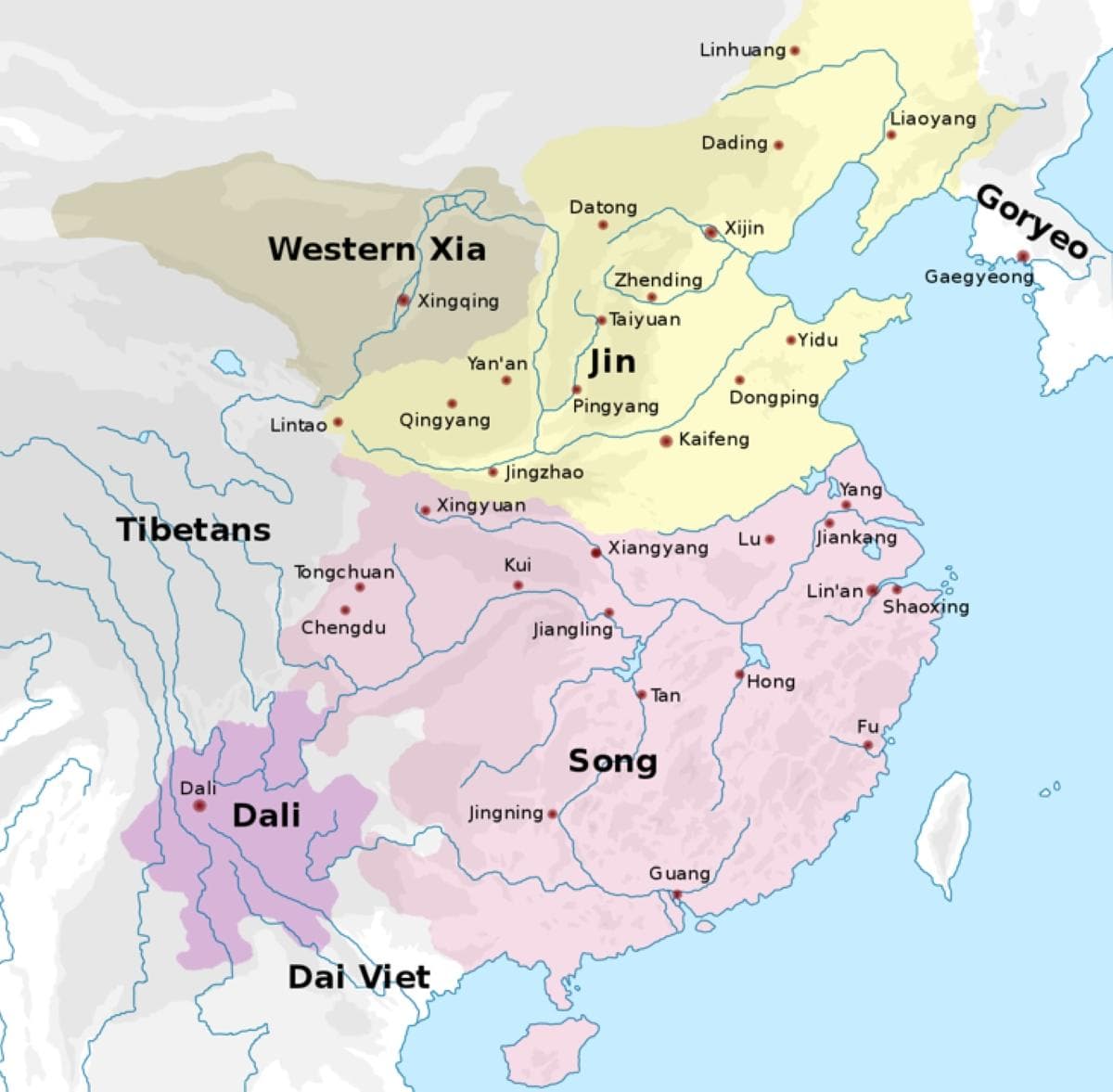
Southern Song in 1142
Peace Treaty
In 1138, Emperor Gaozong appointed Qin Hui (秦桧) as his Grand Chancellor and sought peace with Jurchen Jin. Qin Hui stripped the military authority of Han Shizhong, a commander resisting Jin. In the same year, Southern Song acknowledged the supremacy of Jin in peace negotiations. They regained territories of Henan (河南) and Shaanxi (陕西), marking a significant diplomatic victory.
However, in 1140, Jin violated the agreement, launching a three-pronged invasion and recapturing Henan and Shaanxi. Led by many notable generals, the Song forces achieved remarkable victories. Particularly, Yue Fei's (岳飞) victory against the Jin commander Wanyan Zongbi in Yancheng (Battle of Yancheng, 郾城之战) allowed them to advance and reclaim the region south of the Yellow River. But later, Emperor Gaozong first summoned the northern troops back and then ordered Yue Fei to halt his campaign and return to the capital. In 1142, on unfounded charges, Emperor Gaozong ordered the execution of Yue Fei and his son, completely stripping the major generals of their military power.
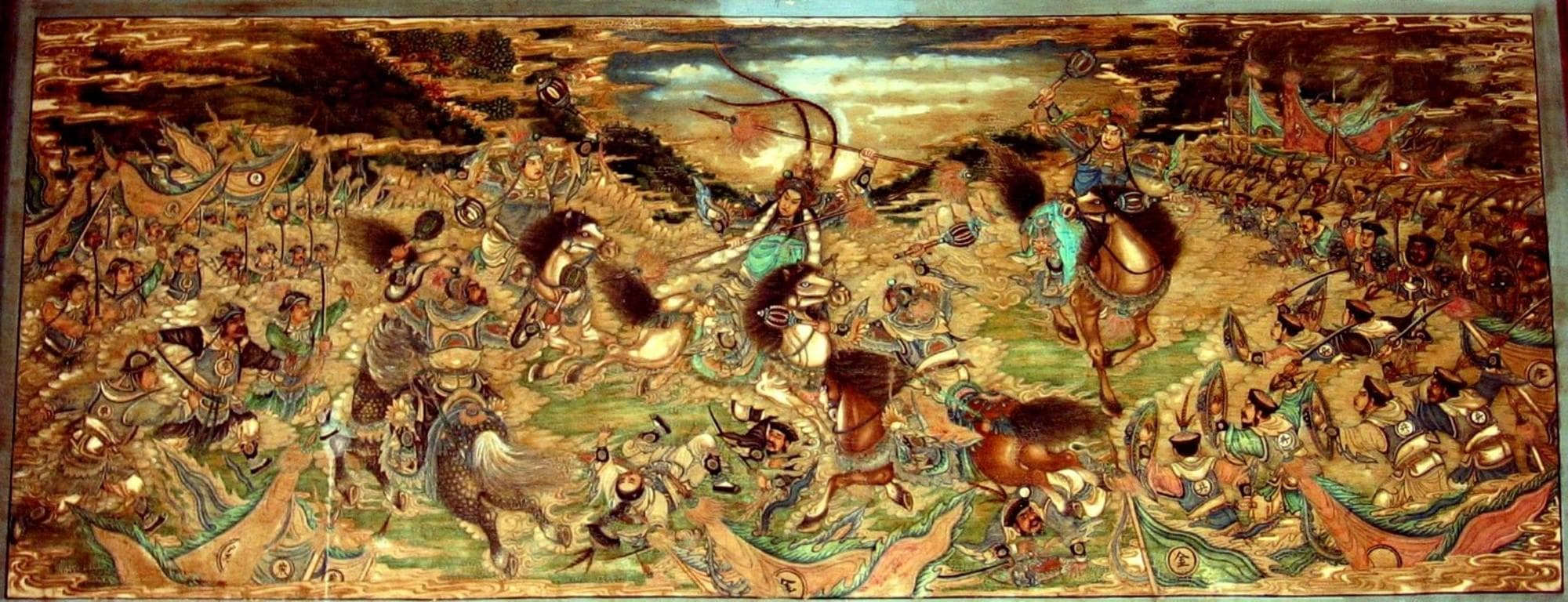
Mural in the Summer Palace of Yue Fei
Southern Song signed the Treaty of Shaoxing (《绍兴和议》) with Jin, where Emperor Gaozong acknowledged the Jin as superior in exchange for a ceasefire, securing the southeastern half of the realm.
Compared to the early years of its establishment, the stabilized Southern Song Dynasty no longer controlled territories like Hebei, Henan, and Guanzhong, experiencing significant territorial shrinkage.
Resisting Jin Invasions
In 1149, Wanyan Liang (完颜亮) staged a coup and declared himself emperor of Jin. After 12 years of preparation, Wanyan Liang launched a southern invasion in May 1161, aiming to conquer the Song Dynasty. Prime Minister Chen Kangbo (陈康伯) led the resistance effort. In October, Song General Li Bao (李宝) led a naval force to use fire tactics, completely annihilating the Jin navy at Tangdao Island (Battle of Tangdao, 唐岛之战). In November, Song official Yu Yunwen (虞允文) defeated Jin forces in Caishi (Battle of Caishi, 采石之战), while Wanyan Liang moved his troops to Yangzhou, and Song Generals tightly defended Zhenjiang (镇江). Wanyan Liang's attempted river crossing failed, and in late November, he was assassinated by one of his subordinates.
The Southern Song emerged victorious. The combined forces of both sides numbered between 700 to 800 thousand.
After Wanyan Liang's failed southern invasion, calls for a Northern Expedition grew louder. Emperor Gaozong decided to abdicate in favor of his adopted son, Zhao Shen (赵昚), who became known as Emperor Xiaozong (宋孝宗).
However, in December 1164, after a failed Northern Expedition, the Treaty of Longxing (隆兴和议) was signed. It transformed the previous vassalage relationship with Jurchen Jin to that of uncle and nephew, with Jin as the uncle. Formal decrees were changed to diplomatic documents, tribute was reduced, and Qinzhou (秦州) and Shangzhou (商州) were ceded, maintaining the existing borders. Silk tribute was reduced from 250,000 to 200,000, and annual payments were reduced to 200,000 taels of silver.
Emperor Xiaozong appointed officials like Yu Yunwen and Zhou Bida (周必大), bringing relative stability to the court. Emperor Gaozong, as an ex-emperor, exerted pressure behind the scenes to oppose Northern expeditions and advocate for peace treaties, and the peaceful situation with Jin was maintained.
In 1187, Emperor Gaozong passed away. After a three-year mourning period, Emperor Xiaozong decided to abdicate in favor of his son, Zhao Dun (赵惇), who became Emperor Guangzong (宋光宗).
Dominance of Powerful Officials
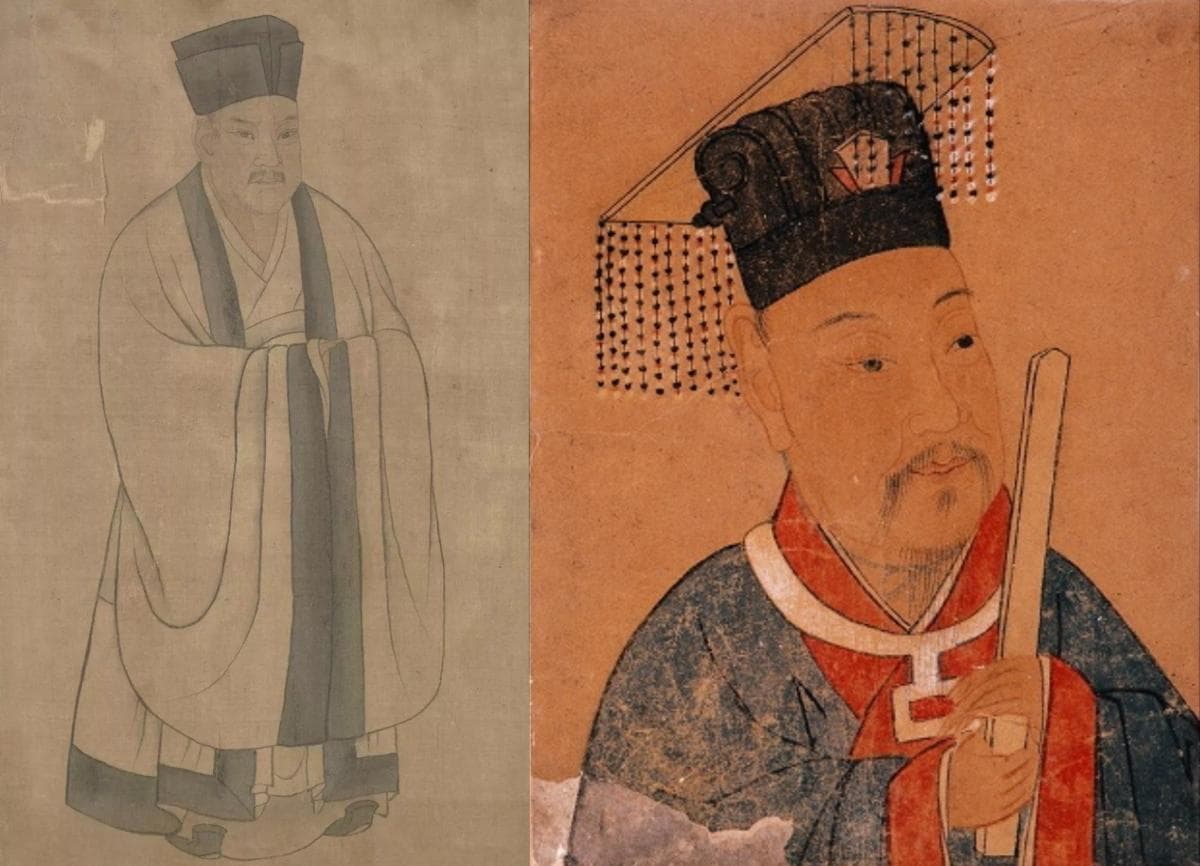
Portraits of Qin Hui (left) and Shi Miyuan (right)
The dominance of powerful officials was a characteristic feature of the later Southern Song. Since the time of Qin Hui (秦桧), powerful officials played significant roles. Emperors allowed these officials to hold considerable power, often using them to control military commanders and maintain control over armed forces.
Due to Emperor Guangzong's frail health, since he ascended the throne in 1189, Empress Li held considerable influence. Guangzong even granted honors and titles to the Li family. Under Li's influence, Guangzong showed little concern for Emperor Xiaozong, and almost no one oversaw the mourning rites for Xiaozong's passing.
In 1194, Prime Minister Zhao Ruyu (赵汝愚) facilitated the abdication of Guangzong with the assistance of Han Tuozhou (韩侂胄), who was Empress Dowager Wu's nephew. As a result, Guangzong's son Zhao Kuo (赵扩) ascended to the throne, becoming Emperor Ningzong (宋宁宗). This was the Shaoxi Nei Chan (绍熙内禅, Shaoxi Internal Abdication).
Emperor Ningzong entrusted Han Tuozhou, who marginalized figures like Zhao Ruyu and took control of political affairs. This led to the Qingyuan Party Prohibition (庆元党禁), which marginalized figures like Zhu Xi (朱熹). In 1206, Han Tuozhou's Northern Expedition was repelled by Jin. In 1208, the Treaty of Jiading (嘉定和议) was signed. Song increased its annual tribute and silk offerings from 200,000 to 300,000 and paid 3 million in military expenses to Jin. Jin relinquished control of Dasan Pass (大散关) and Haozhou (濠州).
In 1207, with the assistance of Shi Miyuan (史弥远), Emperor Ningzong executed Han Tuozhou. From then on, Shi Miyuan rose to prominence. In 1224, upon Ningzong's death and knowing that Prince Zhao Hong (赵竑) held resentment towards him, Shi Miyuan manipulated a decree to enthrone Emperor Lizong (宋理宗). Subsequently, Shi Miyuan gained even greater authority.
Emperor Lizong delegated all state affairs to Shi Miyuan, seldom involving himself in governance. Shi Miyuan ruled for 26 years, contributing to the increasing political decay of Southern Song. Nonetheless, he also supported Jin resistance efforts led by figures like Li Quan (李全).
After Shi Miyuan's death in 1233, Emperor Lizong finally took formal control. He entrusted political matters to Ding Daquan (丁大全), later placing greater trust in Jia Sidao (贾似道), laying the groundwork for the eventual downfall of the Southern Song Dynasty.
Rise of the Mongols
As the military strength of Jurchen Jin declined during the reign of Emperor Zhangzong of Jin (金章宗, reigned 1190-1208), the power of the Mongols began to grow, and they no longer submitted to Jin authority (1170).
In 1204, the Mongol leader Temüjin (铁木真) conquered various tribes on the Mongolian Plateau. In 1206, he established the Mongol Empire (大蒙古国) and took the title "Genghis Khan."
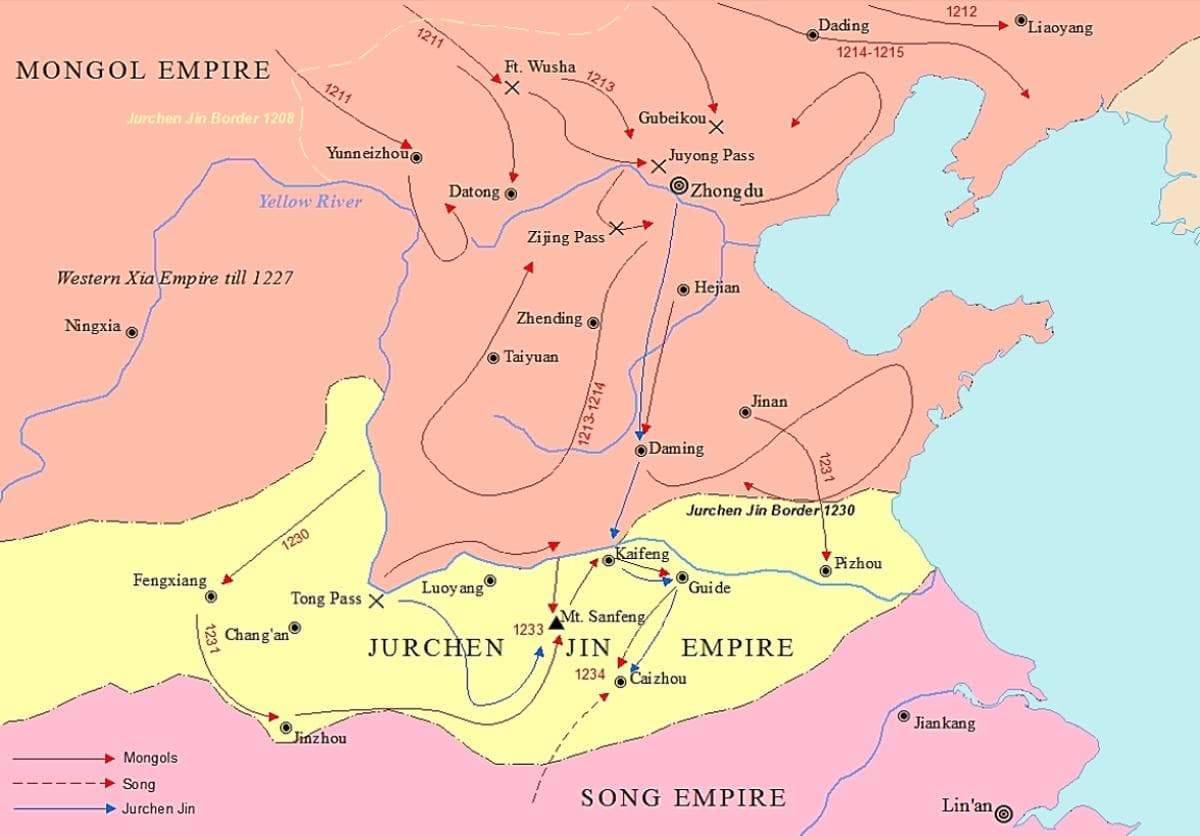
Conquest of Jurchen Jin by Mongols and Southern Song
In 1214, Jin suffered a blow from the Mongols, forcing them to move capital from Yanjing (燕京) to Kaifeng. Emperor Ningzong of Song accepted a proposal to cease the annual tribute to Jin. In 1217, in order to expand their territory and compensate for the lands taken by the Mongols, Jin, under the pretext that Southern Song no longer paid tribute, launched a southern invasion. Southern Song, in agreement with the Mongols, joined forces to repel Jin.
In 1231, the Mongol army sought to pass through Song territory to attack Jin. Song refused, but the Mongols forcibly proceeded. In the Battle of Sanfengshan (三峰山之战) in 1232, the Mongols annihilated the main Jin army, signaling Jurchen Jin's imminent downfall. In December, Emperor Lizong of Song, realizing that Jin was on the verge of collapse and having no shielding effect, agreed to join forces with the Mongols to defeat Jin. The agreement stipulated that lands south of the Yellow River would belong to Southern Song, while those to the north would belong to the Mongols.
In 1233, Emperor Aizong of Jin (金哀宗) fled to Caizhou (蔡州). Southern Song captured Tangzhou (唐州) and other territories of Jin. In September, Emperor Aizong proposed a joint resistance against the Mongols, but Song continued to campaign against Jin. In January 1234, the Mongol-Song coalition captured Caizhou of Jin, where Emperor Aizong took his own life, marking the end of the Jin Dynasty.
At this point, Southern Song shared a border with the Mongols. With the loss of Jin as a barrier, they faced a more formidable threat from the advancing Mongols.
The End of Southern Song
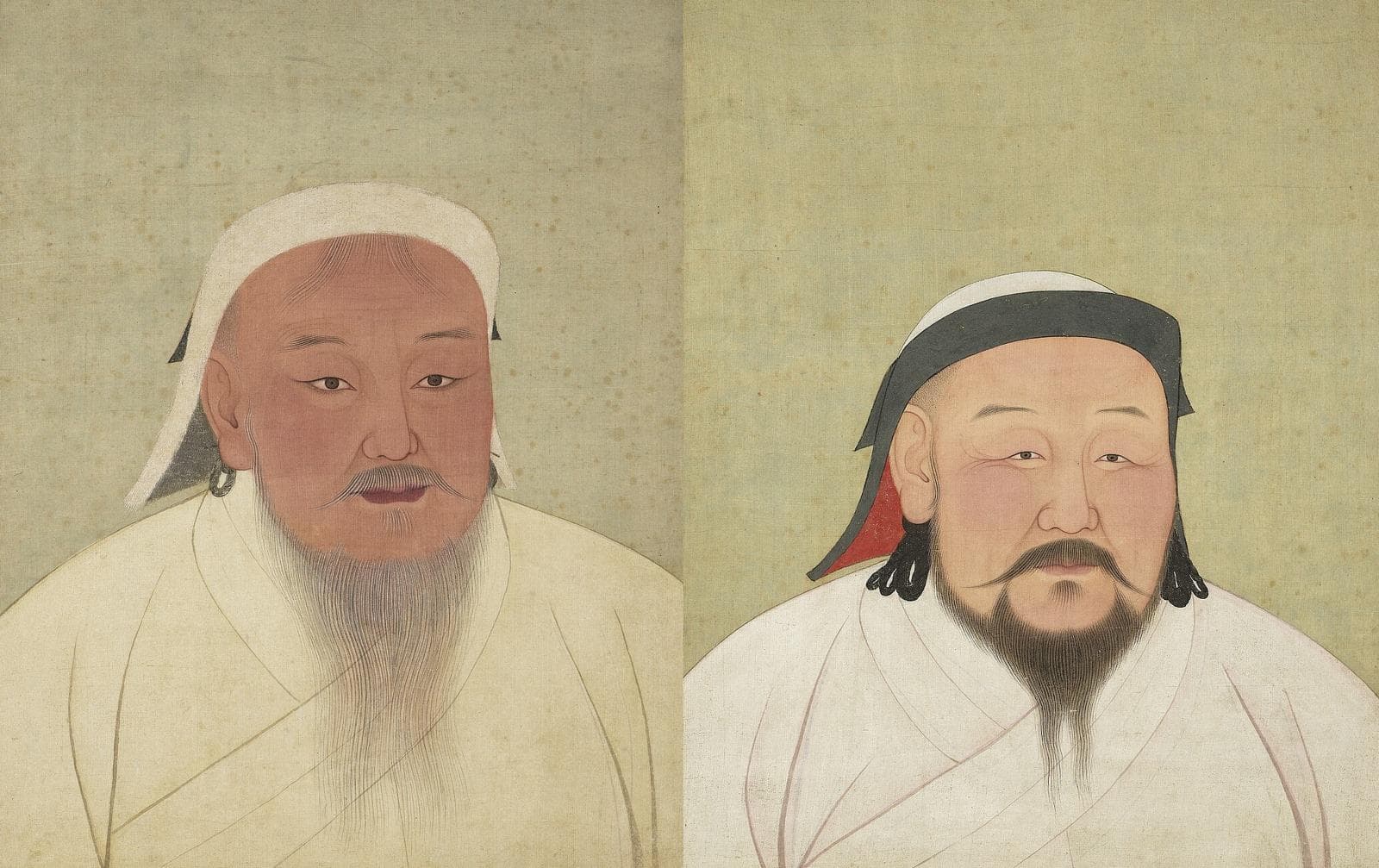
Portraits of Genghis Khan (left) and Kublai Khan (right)
Starting in 1235, the Mongols launched a comprehensive invasion of Southern Song.
Mongols were repelled for their first attempt. Unwilling to accept defeat, they made subsequent attempts, nearly reaching the northern bank of the Yangtze River. Due to the courageous efforts of Southern Song's well-equipped navy, the Mongols were defeated, thwarting their attempt to cross the river.
Subsequently, under the command of several capable leaders, Southern Song's military and civilians defeated the Mongols multiple times. In 1239, Southern Song reclaimed territories including Xiangyang (襄阳) from the Mongols. In 1245, Mongol forces crossed the Huai River (淮河) and invaded Southern Song territory.
In 1259, Möngke Khan (蒙哥) of the Mongol Empire waged a campaign against Hezhou (合州). In July, during the Siege of Diaoyucheng (钓鱼城之战), he was wounded by an arrow and passed away. His brother Kublai (忽必烈) was engaged in a conflict with Southern Song in Ezhou (鄂州) at the time. Upon hearing the news, Kublai immediately withdrew his troops to secure his claim to the Great Khan.
Southern Song's Jia Sidao (贾似道) sent envoys to negotiate peace with Kublai, seeking to maintain stability. After returning to the capital, Jia Sidao, with the assistance of his sister who was an imperial consort, orchestrated the removal of Prime Minister Ding Daquan (丁大全) and assumed the position of power. Jia Sidao gained favor with border defense commanders, concealed the territorial concessions made to the Mongols, and further supported the enthronement of his nephew as Emperor Duzong (宋度宗), consolidating his power.
In 1260, after Kublai established himself as Khan, he sent envoy Hao Jing (郝经) to continue peace talks with Jia Sidao. However, Hao was detained by Jia in Zhenzhou (真州, present-day Yizheng, Jiangsu, 江苏仪征). In 1267, Kublai Khan ordered an attack on the key Southern Song stronghold, Xiangyang (Battle of Xiangyang, 襄阳之战).
The Southern Song managed to sustain the city by continuously resupplying resources via the Han River (汉水). Commanders Lv Wendu (吕文德) and Lv Wenhuan (吕文焕) defended the city for six years. In 1271, Kublai Khan established the Yuan Dynasty (元朝, Yuán) in the Central Plains. In 1272, the brothers Zhang Shun (张顺) and Zhang Gui (张贵) led a valiant defense against the Mongol forces. In 1273, Fancheng (樊城) fell, and Xiangyang (襄阳) was captured. Lv Wenhuan ultimately surrendered, marking the end of the six-year defense of Xiangyang.
In the face of the Mongol invasion, Emperor Duzong fell ill and passed away.
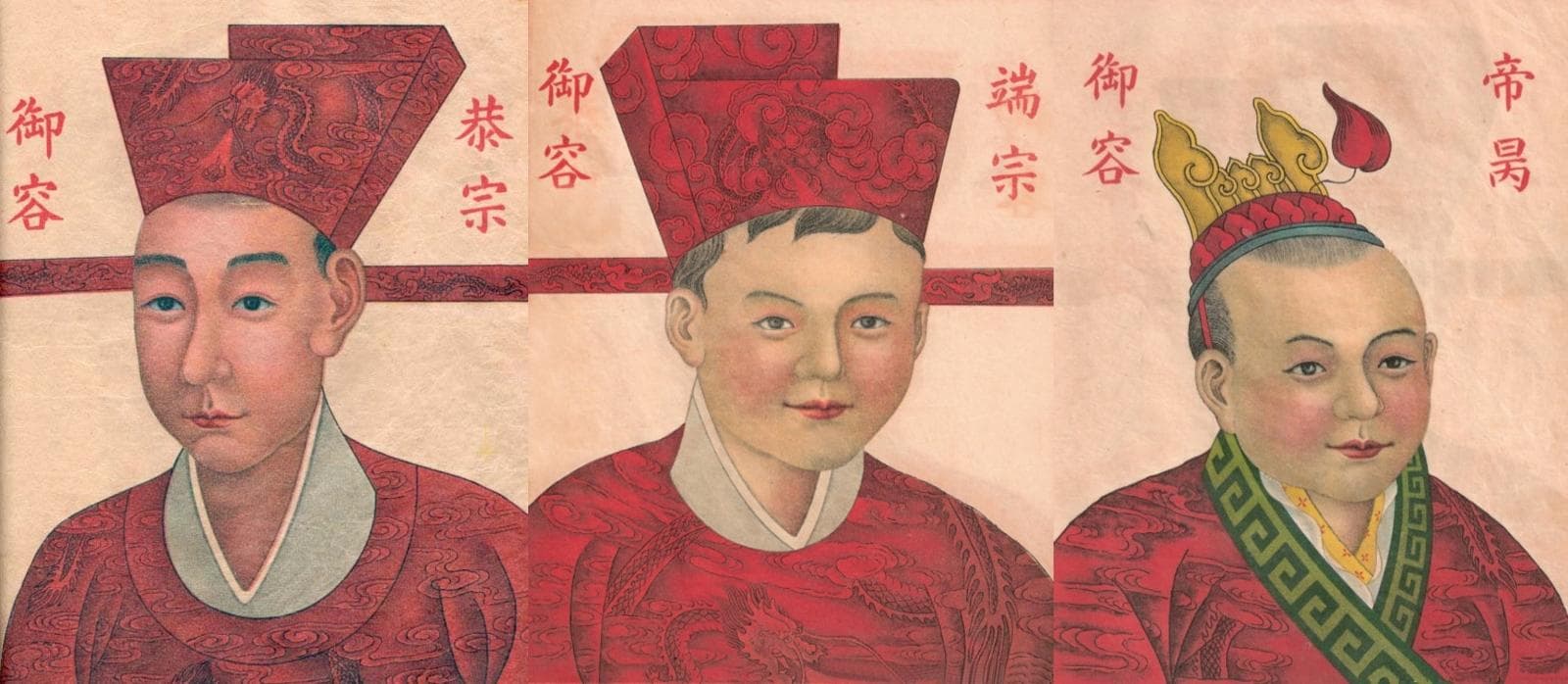
Portraits of the last three young emperors of Southern Song.
Left to right: Emperor Gong, Emperor Duanzong, and Zhao Bing.
During the Mongol southward invasion, Southern Song forces fought to the death, with many losses of notable officials and leaders. Empress Dowager Xie issued a mournful decree, rallying the entire nation to fight. Zhang Shijie (张世杰), Wen Tianxiang (文天祥), and Li Fei (李芾) led troops to assist. On February 4, 1276, the Mongols took the Southern Song capital Lin'an, capturing the 5-year-old Emperor Gong (宋恭帝), signaling the impending fall of Southern Song.
However, remnants of Southern Song, led by Lu Xiufu (陆秀夫), Wen Tianxiang, and Zhang Shijie, established a small court in Fuzhou (福州), where they enthroned a young Emperor Duanzong (宋端宗). The Mongols relentlessly pursued Emperor Duanzong, forcing him to continually flee southward. Duanzong succumbed to illness and passed away after falling into the water.
Lu Xiufu then established another young monarch, Zhao Bing (赵昺), fleeing to areas around Xinhui (新会) and Nanhai (南海). Wen Tianxiang was captured after a defeat in Haifeng (海丰). The remnants of Southern Song faced utter despair, culminating in the Battle of Yamen (崖门海战) on March 19, 1279. Lu Xiufu tied the imperial seal to the young emperor and jumped into the sea carrying him on his back, ending their own lives.
With this, Southern Song's 152-year rule officially came to an end, marking the conclusion of the Song Dynasty after a reign of 319 years.
Read More
Southern Song Achievements - A Flourishing Tapestry of Culture and Progress